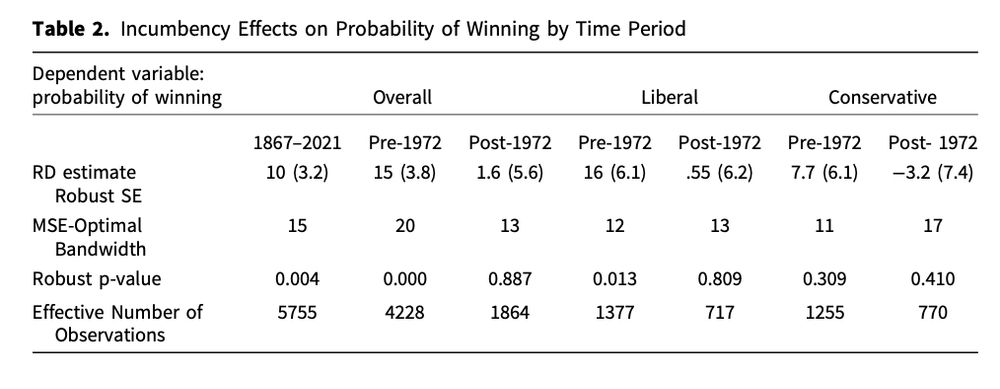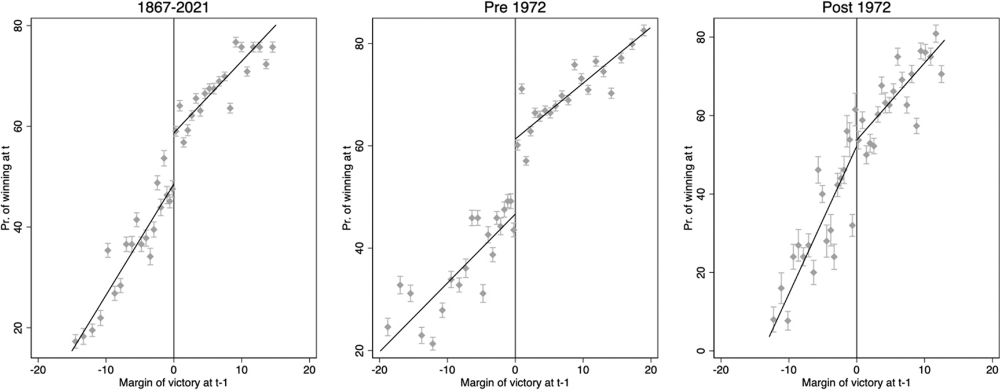Semra Sevi
@semrasevi.bsky.social
Assistant Professor of Political Science at the University of Toronto
www.semrasevi.com
www.semrasevi.com
It’s true, the paparazzi (aka my mom) won’t stop calling! 🥰
November 8, 2025 at 6:00 PM
It’s true, the paparazzi (aka my mom) won’t stop calling! 🥰
Congrats! Can't wait to read this.
September 4, 2025 at 6:12 PM
Congrats! Can't wait to read this.
Very cool! Looking forward to read these. The last one is intriguing 😉
August 16, 2025 at 12:17 PM
Very cool! Looking forward to read these. The last one is intriguing 😉
Thanks. Republicans appear more biased, but that doesn't mean they're more likely to hide it. We didn't measure overt bias.
August 16, 2025 at 1:45 AM
Thanks. Republicans appear more biased, but that doesn't mean they're more likely to hide it. We didn't measure overt bias.
Thanks! Would love to hear more about what you're doing with list experiments.
August 15, 2025 at 6:03 PM
Thanks! Would love to hear more about what you're doing with list experiments.
Congrats, Alex!! I’m so happy for you!
August 10, 2025 at 6:08 PM
Congrats, Alex!! I’m so happy for you!
Why is reciprocity so weak in 🇨🇦?
Strong party discipline limits side deals even in the more flexible world of PMBs.
Our study, using a rare real-world lottery, shows:
Legislative support often reflects shared values, not traded favours.
Not all politics is transactional.
Strong party discipline limits side deals even in the more flexible world of PMBs.
Our study, using a rare real-world lottery, shows:
Legislative support often reflects shared values, not traded favours.
Not all politics is transactional.
July 11, 2025 at 1:49 PM
Why is reciprocity so weak in 🇨🇦?
Strong party discipline limits side deals even in the more flexible world of PMBs.
Our study, using a rare real-world lottery, shows:
Legislative support often reflects shared values, not traded favours.
Not all politics is transactional.
Strong party discipline limits side deals even in the more flexible world of PMBs.
Our study, using a rare real-world lottery, shows:
Legislative support often reflects shared values, not traded favours.
Not all politics is transactional.
So why second at all?
✅ Shared party
✅ Common values
✅ Constituency interests
In other words: homophily, not horse-trading.
Sometimes, MPs just support what they believe in, not because they expect payback.
✅ Shared party
✅ Common values
✅ Constituency interests
In other words: homophily, not horse-trading.
Sometimes, MPs just support what they believe in, not because they expect payback.
July 11, 2025 at 1:49 PM
So why second at all?
✅ Shared party
✅ Common values
✅ Constituency interests
In other words: homophily, not horse-trading.
Sometimes, MPs just support what they believe in, not because they expect payback.
✅ Shared party
✅ Common values
✅ Constituency interests
In other words: homophily, not horse-trading.
Sometimes, MPs just support what they believe in, not because they expect payback.
Weak evidence for strategic seconding.
MPs with better lottery spots are slightly more likely to second others, and there's almost no evidence that favours are returned in future parliaments.
MPs with better lottery spots are slightly more likely to second others, and there's almost no evidence that favours are returned in future parliaments.
July 11, 2025 at 1:49 PM
Weak evidence for strategic seconding.
MPs with better lottery spots are slightly more likely to second others, and there's almost no evidence that favours are returned in future parliaments.
MPs with better lottery spots are slightly more likely to second others, and there's almost no evidence that favours are returned in future parliaments.
We tested two things:
🔁 Do MPs second each other within the same parliament?
🔄 Do they return favors across different parliaments?
The results?
🔁 Do MPs second each other within the same parliament?
🔄 Do they return favors across different parliaments?
The results?
July 11, 2025 at 1:49 PM
We tested two things:
🔁 Do MPs second each other within the same parliament?
🔄 Do they return favors across different parliaments?
The results?
🔁 Do MPs second each other within the same parliament?
🔄 Do they return favors across different parliaments?
The results?
After a PMB is introduced, MPs can formally second it to show support.
If reciprocity exists, we’d expect MPs with good lottery spots to second others hoping to get support back when it’s their turn.
If reciprocity exists, we’d expect MPs with good lottery spots to second others hoping to get support back when it’s their turn.
July 11, 2025 at 1:49 PM
After a PMB is introduced, MPs can formally second it to show support.
If reciprocity exists, we’d expect MPs with good lottery spots to second others hoping to get support back when it’s their turn.
If reciprocity exists, we’d expect MPs with good lottery spots to second others hoping to get support back when it’s their turn.
In Canada, MPs are randomly assigned a spot in a lottery that determines who can introduce a private member’s bill (PMB).
This lets us test:
· Who supports whom
· Whether support gets repaid
· If it’s loyalty, strategy or something else
This lets us test:
· Who supports whom
· Whether support gets repaid
· If it’s loyalty, strategy or something else
July 11, 2025 at 1:49 PM
In Canada, MPs are randomly assigned a spot in a lottery that determines who can introduce a private member’s bill (PMB).
This lets us test:
· Who supports whom
· Whether support gets repaid
· If it’s loyalty, strategy or something else
This lets us test:
· Who supports whom
· Whether support gets repaid
· If it’s loyalty, strategy or something else
What changed?
When party labels appeared on ballots, voters relied more on partisan cues than indiv. candidate familiarity. Result? The personal edge of incumbents disappeared. Party > Person.
Link: www.cambridge.org/core/journal...
@uoft.bsky.social
When party labels appeared on ballots, voters relied more on partisan cues than indiv. candidate familiarity. Result? The personal edge of incumbents disappeared. Party > Person.
Link: www.cambridge.org/core/journal...
@uoft.bsky.social
The Incumbency Advantage in Canadian Elections | Canadian Journal of Political Science/Revue canadienne de science politique | Cambridge Core
The Incumbency Advantage in Canadian Elections
www.cambridge.org
June 9, 2025 at 4:52 PM
What changed?
When party labels appeared on ballots, voters relied more on partisan cues than indiv. candidate familiarity. Result? The personal edge of incumbents disappeared. Party > Person.
Link: www.cambridge.org/core/journal...
@uoft.bsky.social
When party labels appeared on ballots, voters relied more on partisan cues than indiv. candidate familiarity. Result? The personal edge of incumbents disappeared. Party > Person.
Link: www.cambridge.org/core/journal...
@uoft.bsky.social
FINDING #2: Party matters more than person
Incumbency advantage:
Liberals pre-1972: +16 pts
Conservatives pre-1972: +8 pts (not significant)
Post-1972: Both parties? Advantage vanishes.
Incumbency advantage:
Liberals pre-1972: +16 pts
Conservatives pre-1972: +8 pts (not significant)
Post-1972: Both parties? Advantage vanishes.

June 9, 2025 at 4:52 PM
FINDING #2: Party matters more than person
Incumbency advantage:
Liberals pre-1972: +16 pts
Conservatives pre-1972: +8 pts (not significant)
Post-1972: Both parties? Advantage vanishes.
Incumbency advantage:
Liberals pre-1972: +16 pts
Conservatives pre-1972: +8 pts (not significant)
Post-1972: Both parties? Advantage vanishes.
Using data from 1867 to 2021, and a RDD, I estimate the causal impact of incumbency on electoral success.
FINDING #1: The incumbency advantage shrank dramatically.
✅ Before 1972: Incumbents had a 15-point edge.
❌ After 1972: Just 2 points, and no longer significant.
FINDING #1: The incumbency advantage shrank dramatically.
✅ Before 1972: Incumbents had a 15-point edge.
❌ After 1972: Just 2 points, and no longer significant.

June 9, 2025 at 4:52 PM
Using data from 1867 to 2021, and a RDD, I estimate the causal impact of incumbency on electoral success.
FINDING #1: The incumbency advantage shrank dramatically.
✅ Before 1972: Incumbents had a 15-point edge.
❌ After 1972: Just 2 points, and no longer significant.
FINDING #1: The incumbency advantage shrank dramatically.
✅ Before 1972: Incumbents had a 15-point edge.
❌ After 1972: Just 2 points, and no longer significant.
Before 1972, Canadian ballots showed only:
• Candidate names
• Occupations
No party labels. No shortcuts for voters.
Then came a 1970 law: Starting in 1972, ballots began listing party affiliations alongside candidate names.
• Candidate names
• Occupations
No party labels. No shortcuts for voters.
Then came a 1970 law: Starting in 1972, ballots began listing party affiliations alongside candidate names.
June 9, 2025 at 4:52 PM
Before 1972, Canadian ballots showed only:
• Candidate names
• Occupations
No party labels. No shortcuts for voters.
Then came a 1970 law: Starting in 1972, ballots began listing party affiliations alongside candidate names.
• Candidate names
• Occupations
No party labels. No shortcuts for voters.
Then came a 1970 law: Starting in 1972, ballots began listing party affiliations alongside candidate names.

